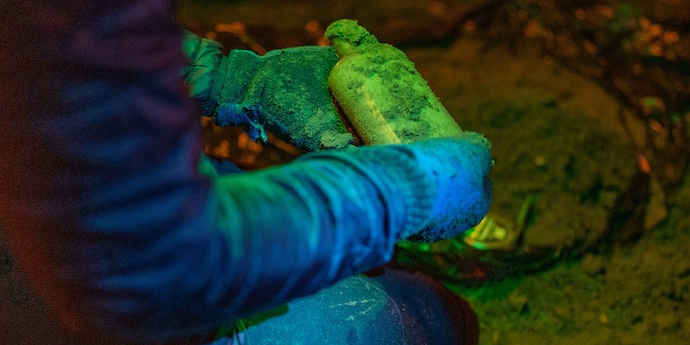 Featured Data Nugget: Over 100 years ago, a scientist buried bottles filled with seeds, and left a map for future scientists to dig them up.
Featured Data Nugget: Over 100 years ago, a scientist buried bottles filled with seeds, and left a map for future scientists to dig them up. Featured Data Nugget: People have hunted whales for over 5,000 years for their meat, oil, and blubber. Today, as populations are struggling to recover, they are faced with additional challenges due to climate change.
Featured Data Nugget: People have hunted whales for over 5,000 years for their meat, oil, and blubber. Today, as populations are struggling to recover, they are faced with additional challenges due to climate change. Featured Data Nugget: When is a mutualism not a mutualism? Under certain environmental conditions, such as soils with high nitrogen, Rhizobia may become parasites to plants.
Featured Data Nugget: When is a mutualism not a mutualism? Under certain environmental conditions, such as soils with high nitrogen, Rhizobia may become parasites to plants. Featured Data Nugget: Grasshopper mice feed on two different species of scorpions - one with a painful sting and one that is painless. Will the mice choose to avoid the scorpions with the painful sting?
Featured Data Nugget: Grasshopper mice feed on two different species of scorpions - one with a painful sting and one that is painless. Will the mice choose to avoid the scorpions with the painful sting? Featured Data Nugget: Floods are common events in streams with potentially beneficial and harmful effects on fish populations, like the cutthroat trout.
Featured Data Nugget: Floods are common events in streams with potentially beneficial and harmful effects on fish populations, like the cutthroat trout. Featured Data Nugget: The Hubbard Brook Experimental Forest is home to the one of the longest running bird studies ever conducted! What can we learn about migratory bird populations from this unique long-term dataset?
Featured Data Nugget: The Hubbard Brook Experimental Forest is home to the one of the longest running bird studies ever conducted! What can we learn about migratory bird populations from this unique long-term dataset? Featured Data Nugget: Big wings allow butterflies to fly everywhere with ease. But you may wonder, why are the wings of some species so brightly colored?
Featured Data Nugget: Big wings allow butterflies to fly everywhere with ease. But you may wonder, why are the wings of some species so brightly colored? Featured Data Nugget: Extreme climate events, like hurricanes, are becoming more frequent and severe. When a hurricane hit the Caribbean, scientists seized the opportunity to observe natural selection by hurricanes.
Featured Data Nugget: Extreme climate events, like hurricanes, are becoming more frequent and severe. When a hurricane hit the Caribbean, scientists seized the opportunity to observe natural selection by hurricanes. Featured Data Nugget: The world's coral reefs are home to a large diversity of plants and animals, and are threatened by climate change. When the water gets too warm, some corals bleach and some can survive.
Featured Data Nugget: The world's coral reefs are home to a large diversity of plants and animals, and are threatened by climate change. When the water gets too warm, some corals bleach and some can survive. Featured Data Nugget: Corn is used to produce most of the biofuels that humans consume today, but it does not make a good habitat for wildlife. Can diverse prairies serve as a viable alternative?
Featured Data Nugget: Corn is used to produce most of the biofuels that humans consume today, but it does not make a good habitat for wildlife. Can diverse prairies serve as a viable alternative? Featured Data Nugget: What can tree rings tell us about the past climate of Australia, and whether current weather patterns are changing due to climate change?
Featured Data Nugget: What can tree rings tell us about the past climate of Australia, and whether current weather patterns are changing due to climate change? Featured Data Nugget: Today more and more people are moving from rural to urban areas. This means that cities are becoming the primary places where many people experience nature and interact with wildlife.
Featured Data Nugget: Today more and more people are moving from rural to urban areas. This means that cities are becoming the primary places where many people experience nature and interact with wildlife. Featured Data Nugget: Climate change is causing waters to warm, and species will need to adapt to survive. Do salmon have the genes necessary to survive in these new conditions?
Featured Data Nugget: Climate change is causing waters to warm, and species will need to adapt to survive. Do salmon have the genes necessary to survive in these new conditions? Featured Data Nugget: Stalk-eyed flies have their eyes at the tip of eyestalks on the sides of their heads. Males with longer eyestalks are better at attracting mates, but they also come at a cost.
Featured Data Nugget: Stalk-eyed flies have their eyes at the tip of eyestalks on the sides of their heads. Males with longer eyestalks are better at attracting mates, but they also come at a cost.
Data Nuggets
Bringing authentic research and data into K-16 classrooms